9 Best Customer Engagement Platforms of 2025

Studies show* the average professional receives around 120 emails daily and sends about 40 in return. Meanwhile, an average employee spends around 23% of their workday checking emails. If you count the personal and marketing emails someone receives, the numbers go even higher.
The flood of email messages makes it hard to keep up with everything and significantly reduces an email’s impact. Customer engagement platforms can help businesses break through this clutter by offering more personalized, multi-channel communication options that go beyond traditional emails.
The key to standing out is creating a meaningful, impactful customer journey that helps you connect with your clients beyond a simple marketing email. In this article, you’ll learn the features to look for in customer engagement platforms and how to choose the best one for your business.
Key takeaways:
- Customer engagement platforms help you improve communication and engagement by offering tools like automation, multi-channel support, and real-time insights, allowing for personalized and seamless interactions with customers.
- Key features of customer engagement platforms include automation, AI, scalability, and performance tracking.
- Top customer engagement platforms like CloudTalk help you optimize sales, support, and customer relationships through integrations and multi-channel communication solutions.
Create a stronger customer engagement strategy with CloudTalk
Key Customer Engagement Platform Features
Instead of spending hours trying to find the best marketing strategy, you might use automation to send personalized follow-up messages based on customer behavior and preferences.
Customer engagement platforms make this possible, analyzing data to help you better understand your clients and their needs.
Here are some key features to look for when choosing yours.
- Automation. Tedious, repetitive tasks take a lot of your time and can lead to human errors. Select a tool that can automate tasks like Call Queueing, Call Flow Designer, Interactive Voice Response, Skills-Based Routing, and Callback.
- Calling. Sales calls are a key part of customer engagement, so a platform that can streamline outbound and inbound calls will improve your Talk/Listen Ratio with your clients and prospects.
- Performance tracking. Ideally, you’ll want a tool that tracks what’s happening within your team, with features such as Agent Status, a Real-Time Dashboard, and Analytics. These will help you improve call center performance, create better sales strategies, and engage with customers in meaningful ways.
- Compliance. A customer engagement platform will undoubtedly deal with personal information, so regulatory compliance is a must. Features that can help include Single Sign-On [SSO], STIR/SHAKEN, and spam protection.
- Coverage. The perfect platform won’t limit who you can contact based on where they are in the world. Instead, you should have a wide variety of options to engage with them, such as text messaging, WhatsApp inbound and outbound messaging, International Numbers, or virtual caller ID.
- Artificial intelligence. It may not seem like a must-have, but AI can boost your sales strategy significantly. AI can analyze data to identify patterns, predict behaviors, and make personalized recommendations, helping you target customers with tailored offers.
- Scalability. You may be starting as a small business with a small customer database, but you shouldn’t select a limiting platform. Choose one that can scale, allowing you to customize your sales or customer service operations to fit the exact needs of your business.
- Multi-channel support and CRM integration. Select a platform you can easily use with your current systems, and that offers support across a wide variety of channels.
8 Top Customer Engagement Tools to Boost The Customer Experience
So, you’ve decided you need a customer engagement platform, but now you’re overwhelmed by the dozens of options out there.
We’ve compiled the best 8 customer engagement tools, along with their key features, use cases, and pricing, to help you make the best decision for your business.
1. CloudTalk

CloudTalk is a cloud-based call center software created to help boost call center performance, customer interactions, engagement, and support. With it, you can analyze your call center metrics, and create personalized call campaigns to help you reach more prospects. Plus, you’ll be able to offer better support, respond to inquiries, and improve the overall customer experience.
Forget about unreliable calls or limited reach. With CloudTalk, you can talk to customers regardless of where they are, and enjoy seamless, reliable calls worldwide. The platform also comes with features like Sentiment Analysis, Interactive Voice Response, and call center Analytics, so you can understand how your customers feel, and what they need, and enhance the way to interact with them.
CloudTalk offers call center automation taking care of tedious tasks like Call Queueing, Callback, or Automatic Call Summary, reducing the risk of human error. Plus, it uses the power of AI to help you adjust your sales scripts and marketing plans. For example, it analyzes customer interactions and behavior, helping you better understand each person’s preferences. This way, you can meet each customer where they are and reach your goals faster.
Key features:
- Automate tasks with VIP Queues, Skill-Based Routing, Workflow, and Callbacks
- Track performance by looking at missed calls, Agent Status, Real-Time Dashboard, and Analytics
- Reach customers worldwide through features like Number Porting, Text Messaging, Toll-Free Numbers, and Automatic Outbound Numbers
- Comply with privacy regulations and get end-to-end protection of your customer’s data
Popular use cases:
- Sales teams: CloudTalk vastly improves the way sales teams work by providing a simple, reliable way to reach prospects.
- Customer support teams: Customer engagement doesn’t end once you make a sale. CloudTalk ensures you can offer support, assisting your customers regardless of where they are in the world. Plus, if you miss a call, the platform comes with a Callback feature, so that even when an agent isn’t available, your customers will receive the help they need.
Pricing:
- Starts at $25/month with custom pricing available
Best for:
- Sales and support teams of all sizes looking to improve customer engagement and experiences
2. Zendesk
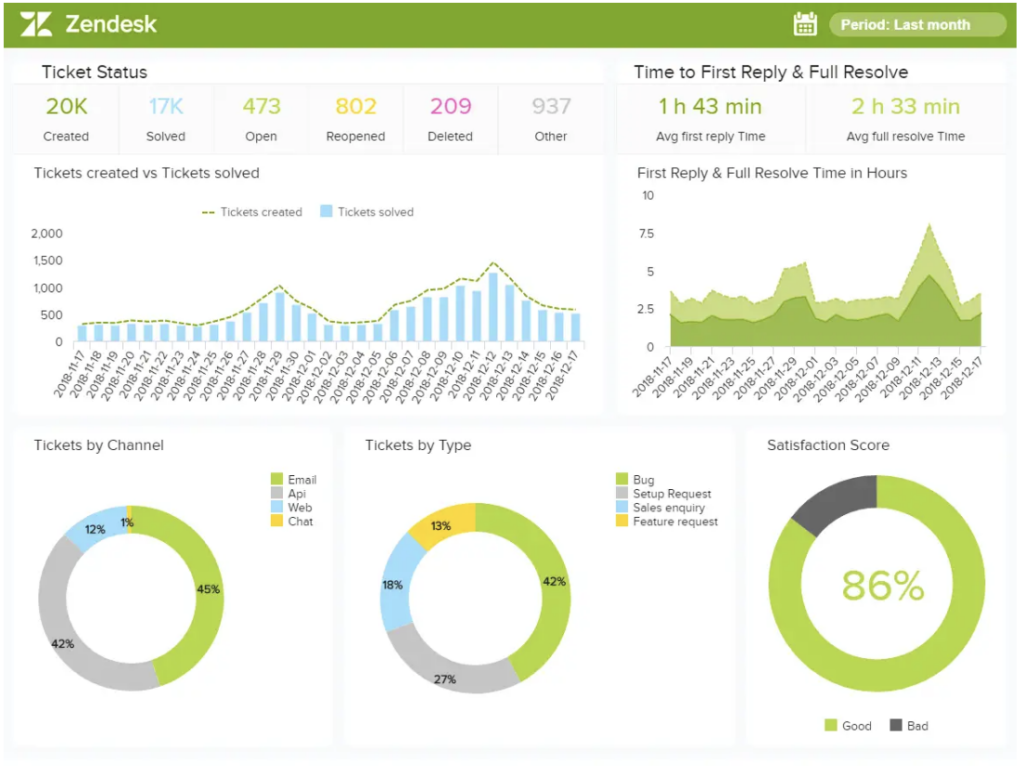
A well-known customer engagement platform, Zendesk prioritizes customer support and experience. It allows you to manage client requests across a wide variety of channels, from email to SMS, live chat, and social media, all in a single workspace.
It integrates with your existing systems and allows you to create a comprehensive knowledge base to offer the best possible support to your customers.
Key features:
- An answer bot that automatically answers common customer questions using AI technology. It significantly reduces the number of tickets that require manual assistance, speeding up the customer service processes.
- A conversational CRM approach that personalizes interactions with each client and improves customer satisfaction.
Popular use cases:
- Managing customer interactions and history: Zendesk integrates with your existing CRM platform and maintains a complete history of customer interactions so you can analyze them and improve your sales and support strategies.
- Building a knowledge base for self-service support: Zendesk lets you create a customized knowledge base where customers can find articles, how-to’s, and FAQs.
Pricing:
- Starts at $19/user/month
Best for:
- Businesses that want to prioritize and offer multi-channel customer support and improve their engagement strategies
3. Typeform
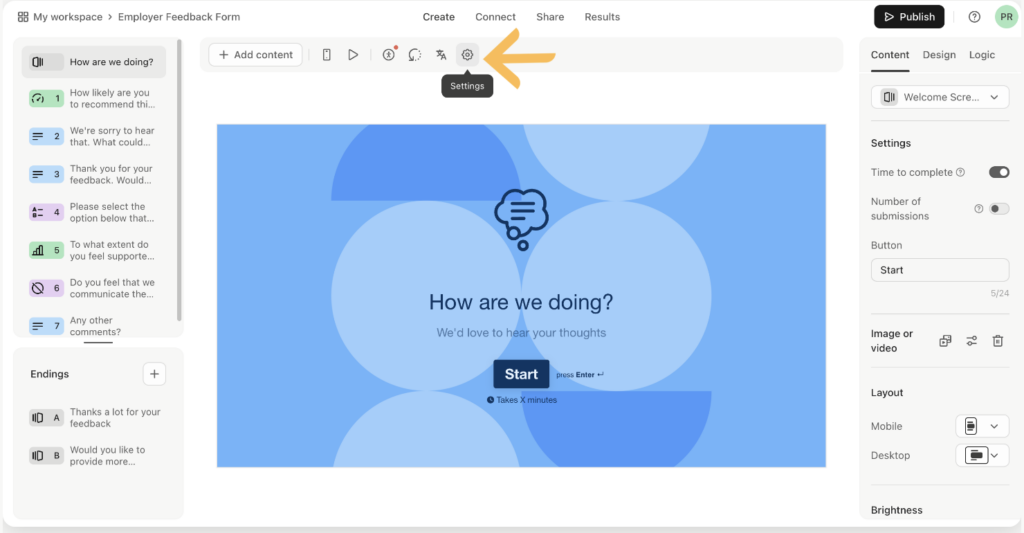
Typeform takes a different approach to customer engagement by offering a platform filled with customizable surveys and forms. It allows you to design each survey, transforming it into a unique experience for your clients.
Key features:
- Easy to integrate with tools like Zapier, Google Sheets, or Slack
- Responsive forms that guarantee a great user experience regardless of the device they use
- Payment integration through various gateways like Stripe so that users can pay right from the form
- Easy data collection and export
Popular use cases:
- Customer feedback surveys: Create as many feedback surveys as you want and give each a unique twist to make the experience more fun and engaging.
- Contact forms: Typeform allows you to say goodbye to boring contact forms and replace them with a more personalized experience.
Pricing:
- Free for a basic plan that allows you to add 10 questions per survey and receive up to 100 responses per month. More advanced plans start at $25/month.
Best for:
- Small to medium-sized businesses. Especially for marketing, product, and customer success teams who want to do comprehensive market research, and get detailed feedback on various campaigns and products.
4. HubSpot CRM
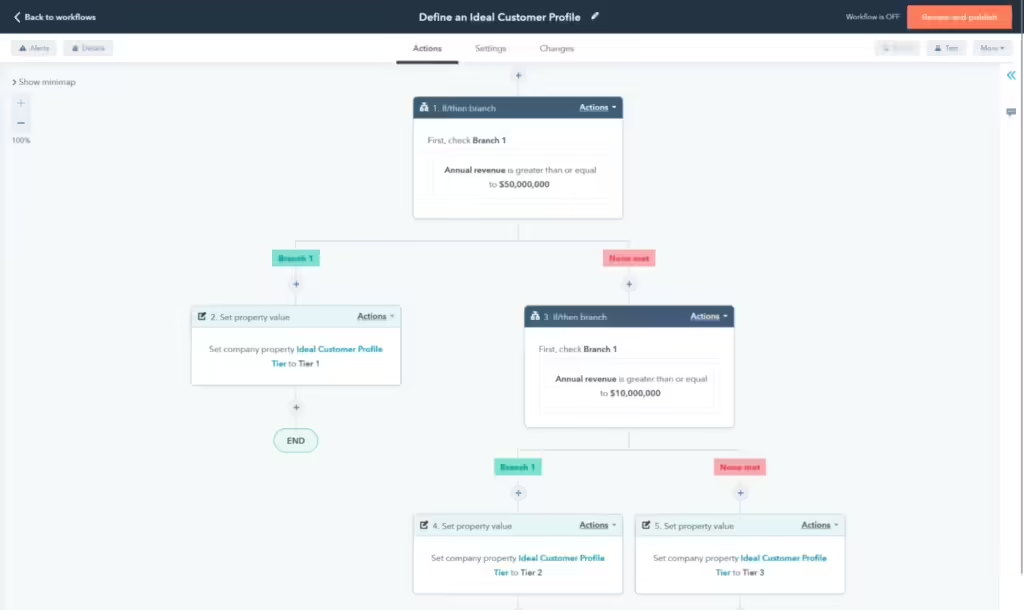
HubSpot CRM is a leading platform for teams wanting to nurture their customer relationships, automate their marketing efforts, and improve how sales and service teams work.
It’s easy to use, integrates with other HubSpot tools and some third-party applications like Outlook or Zapier, and is scalable. Its greatest advantage is it can consolidate all your customer interactions into a single platform, whether it’s marketing, sales, or support.
Key features:
- Customer service tools that include ticketing systems and feedback tools
- Contact and lead management that helps keep data organized, track interactions, and monitor your sales cycle
- Dedicated hubs for marketing, sales, services, CMS, and operations
- Live chat and chatbots that use AI technologies to solve the most common issues your customers might face
Popular use cases:
- Email marketing: With HubSpot, you can send personalized emails and newsletters, and track performance with built-in analytics to improve your marketing campaigns and customer engagement.
- Customer relationship management: You can maintain detailed records of customer data and interactions to improve sales and support processes.
Pricing:
- For individuals and small teams, there’s a free plan with up to 5 users, with more advanced plans starting at $15/month/seat. For larger businesses and enterprises, prices start at $800/month.
Best for:
- Small to medium-sized businesses and service-based companies that need an easy-to-use, scalable CRM to manage customer relationships
5. Intercom
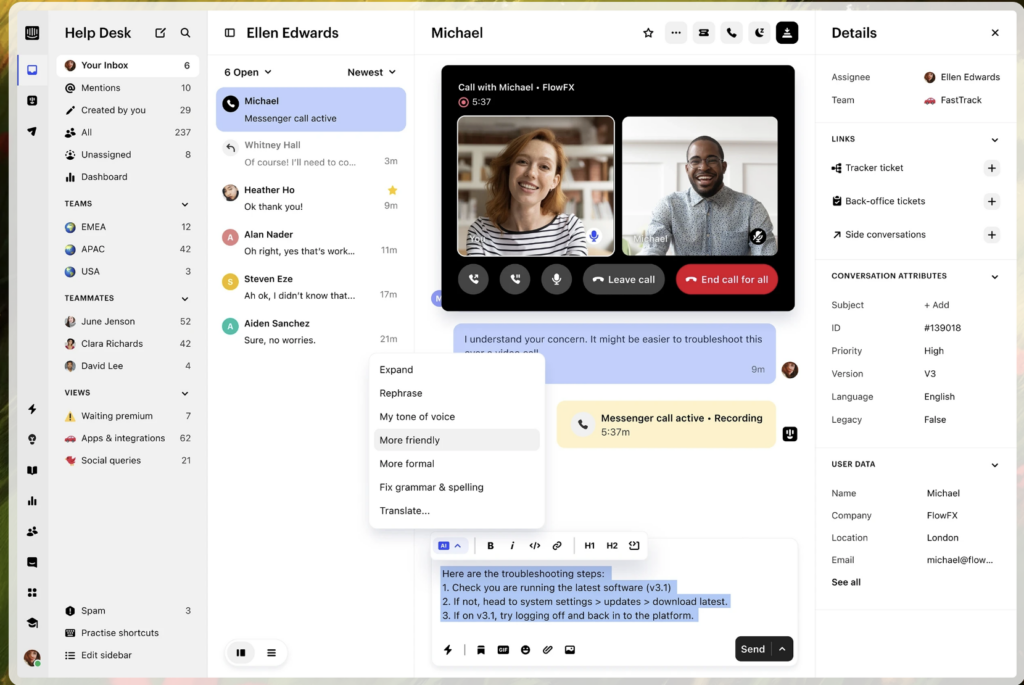
Intercom is a customer engagement platform with features like in-app messaging, surveys, and a knowledge base builder. Its main purpose is to improve your communication with customers while enhancing the user experience.
Key features:
- A unified inbox where you’ll find inquiries, live chats, emails, and other interactions
- Automated chatbots that can engage with users, answer the most commonly asked questions, and assist with things like appointment scheduling
- A ticketing system that can easily convert chat interactions into tickets when the issues are too complex and can’t be solved on the spot
Popular use cases:
- Sales and conversion optimization: Engage website visitors through targeted messages and chatbots that can answer pre-sale questions and turn prospects into customers.
- Customer engagement and support: Send personalized in-app messages based on the user’s activity. You can also offer quick, targeted support via chatbots and live chat.
Pricing:
- Starts at $29/seat/month
Best for:
- Startups and SMBs, especially those in the SaaS and tech sectors, that want to engage with their customers more effectively, boosting sales and support.
6. Twilio
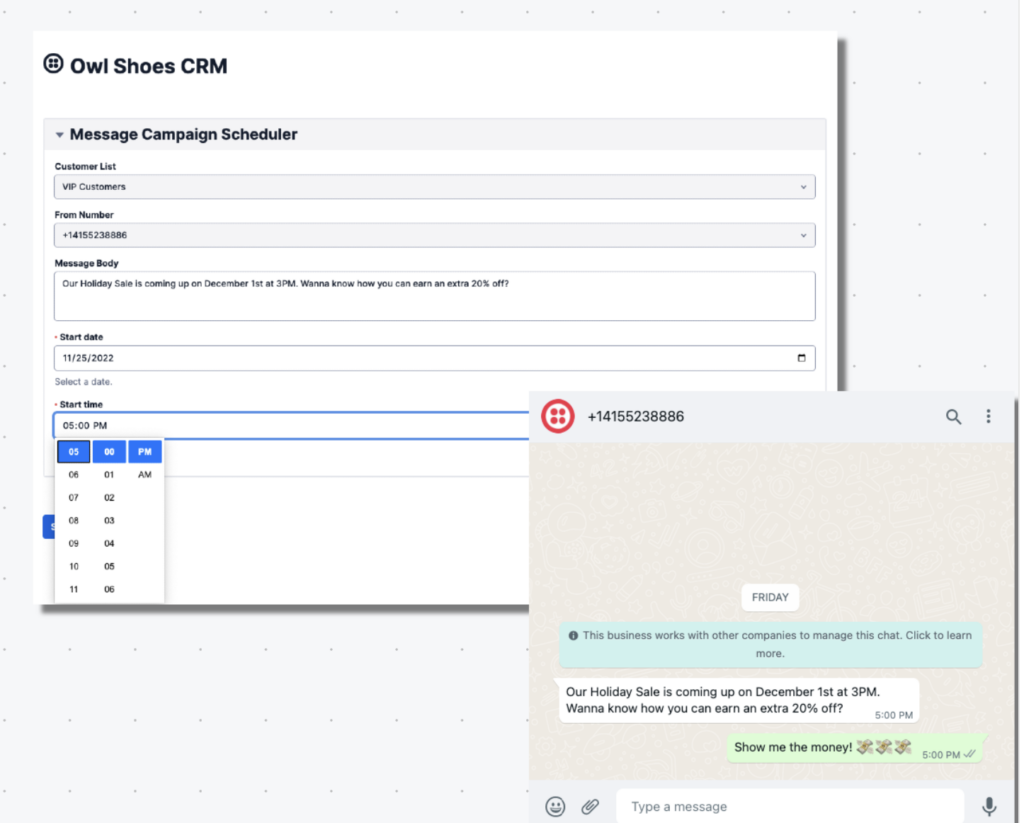
If you’re looking for a cloud-based customer engagement platform, Twilio might be the answer. It offers a wide range of communication channels, such as SMS, video, chat, or email. It also has developer-friendly APIs that allow you to customize the platform as needed.
Key features:
- A programmable Interactive Voice Response system and call routing that you can use to manage call flows with more ease
- Multichannel engagement that ensures you can meet customers on their preferred communication channel, whether that’s WhatsApp, SMS, video chat, or email
- A scalable infrastructure that can work for both small and large companies
Popular use cases:
- Omnichannel marketing: Send targeted messages to your leads through email, SMS, or other messaging apps.
- Transactional messaging and customer notifications. Twilio can send real-time notifications, keeping customers informed about delivery status or upcoming appointments.
Pricing:
- Twilio operates on a flexible pay-as-you-go model where the pricing depends on the services you use. For instance, for sending and receiving SMS within the US, the price will be $0.0075 per message sent or received. International options are available but will cost more depending on the country.
Best for:
- Companies of all sizes that want to send more targeted notifications to their customers, including alerts and notifications, across a wide variety of channels
7. Kangaroo

Kangaroo offers a different approach to customer engagement through a loyalty and rewards platform that gamifies processes you usually use for retention and engagement. It has features for every need, from simply redeeming loyalty points, to SMS or email marketing. You can also integrate it with your existing POS so you can enroll customers faster.
Key features:
- A loyalty rewards program that can increase customer retention and repeat sales
- The gamification of your loyalty program that can turn a boring buying experience into something fun that your customers will want to come back to
- POS and ecommerce integrations that help streamline operations and ensure a seamless transaction
Popular use cases:
- Loyalty program management: With Kangaroo, you can create and manage customer loyalty programs, where your clients will earn points or other rewards for purchases or referrals.
- Customer retention campaigns: With data-driven insights and marketing automation, you can re-engage older customers who haven’t purchased in a while, offer discounts, and other promotions to bring them back.
Pricing:
- Starts at $59/month
Best for:
- Ecommerce businesses of all sizes that want to boost their customer engagement and retention through loyalty rewards programs
8. Pendo
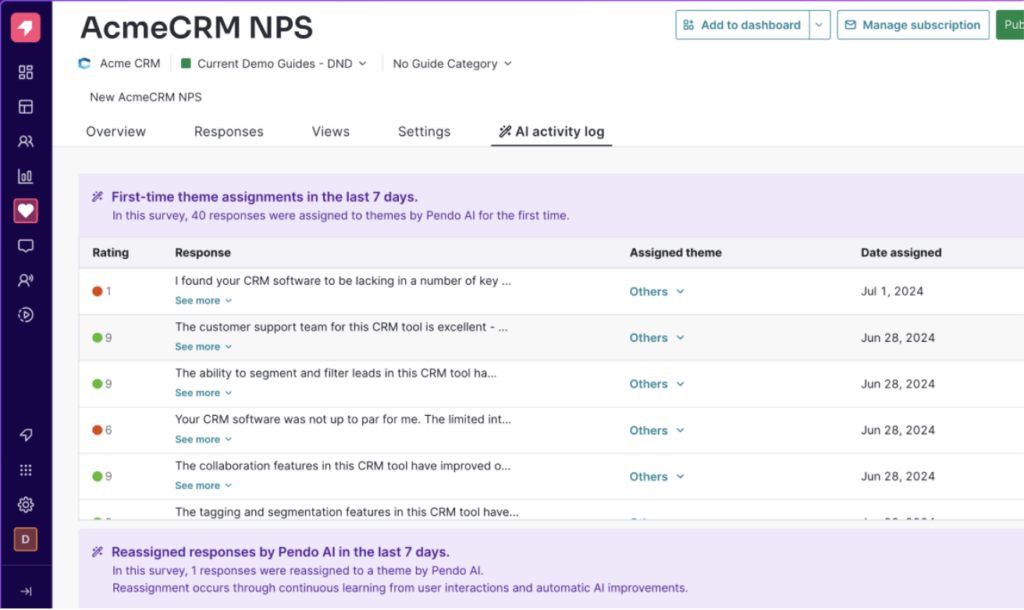
If you want to understand how users interact with your products and how you can create a better offer, Pendo may be the tool for you. It’s a product experience platform created with product managers, UX teams, and customer success teams in mind—combining product analytics, user feedback, and in-app messaging into a single platform.
Key features:
- AI chatbots that answer commonly asked questions and support customers
- Auto-generated guides that offer customers and prospects product tours
Popular use cases:
- Product optimization: Pendo’s detailed analytics can show you which of the product’s features work well and which need to be optimized.
- Customer feedback collection: With Pendo’s in-app surveys and polls, you can better understand how they use the product and how they feel about it.
Pricing:
- There is a freemium version with limited capabilities. For more options, the price is customizable depending on your needs.
Best for:
- Product managers, UX teams, and customer success teams who want to optimize their product, test out new features, and better understand their users’ needs
9. REVE Chat
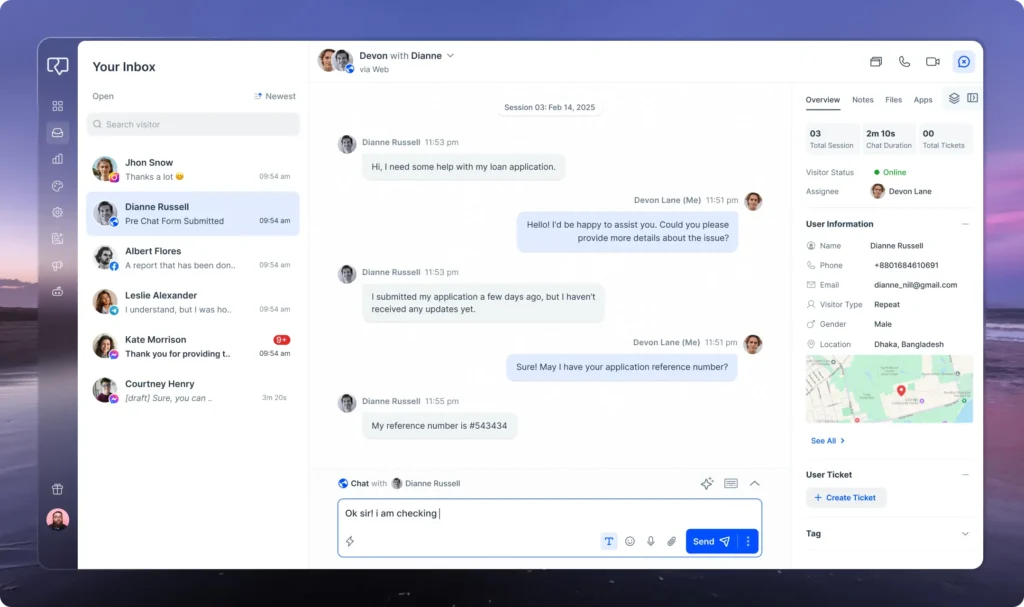
REVE Chat is the best customer engagement platform for businesses looking to deliver smarter, seamless, and scalable customer service. With AI-powered chatbots, live chat, ticketing, video chat, and co-browsing, all in one platform, REVE Chat helps businesses automate conversations, resolve issues faster, and build meaningful relationships with customers.
Key Features
- Brain AI: Multilingual support, Context-aware, human-like responses powered by advanced LLMs (GPT, LLAMA).
- Omnichannel Engagement: Interact with customers on the website, WhatsApp, Facebook, and more, on one unified dashboard
- Visual Chatbot Builder: Visually create custom chatbot flows without writing a single line of code.
- Smart Handover: Seamless transfer from bot to live agents for complex queries
- Co-Browsing & Video Chat: Real-time collaboration for high-touch support and sales
Popular Use Cases:
- Automated FAQ Handling: Instantly resolve common queries to reduce support load
- Lead Capture & Qualification: Engage and qualify leads with conversational forms
- Multilingual Customer Support: Connect with global audiences in their preferred language
- Customer Retention: Proactive support that keeps customers coming back
- Sales Assistance: Guide users in real time during their buying journey
Pricing:
- Starts at $15/month. Free trial available.
Best For:
- Businesses of all sizes in eCommerce, SaaS, banking, telecom, and more, anyone aiming to elevate customer experience and engagement with smart automation and real-time support.
Customer Engagement Platforms—How to Choose the Best One?
Customer engagement platforms can boost sales and retention, help you create better products, and offer better support. To choose one, you’ll first need to know your goals. Are you trying to create a loyalty program or launch a new feature? Or are you trying to communicate better with each customer, regardless of where they are?
Targeted platforms with rewards programs are useful, but most companies will benefit more from a versatile communication platform like CloudTalk. By blending customer engagement with advanced telecommunication features, you can connect with customers globally and keep costs low even as you scale.
Whatever platform you choose, make sure it’s easy to use, scalable, and provides value for both your employees and your customers.
For instance, DiscoverCars, an international car rental site, partnered with CloudTalk to manage high call volumes that affected customer satisfaction. With CloudTalk’s Interactive Voice Response solution, they automated routine queries and directed complex issues to the right agents, reducing wait times and improving efficiency and customer satisfaction.
Create a stronger customer engagement strategy with CloudTalk
Frequently Asked Questions About Customer Engagement Platforms
What is a customer engagement platform?
A customer engagement platform is a suite of tools that enables interactions between you and your customers and helps you track and analyze these interactions.
What does a customer engagement platform mean?
A customer engagement platform is usually a tool that offers a means to contact customers and receive their inquiries via phone, SMS, email, and other means of communication.
Customer engagement platforms vs CRM?
Customer engagement platforms and CRM have different but complementary purposes. A CRM focuses on organizing and tracking customer data and sales pipelines, which makes it ideal for sales and marketing teams.
In contrast, customer engagement platforms enhance the user’s experience, offering multi-channel interactions, personalized messaging, and even loyalty programs.
How do cloud-based communications platforms drive customer engagement?
Cloud-based communications as well and the call enter platforms enhance customer engagement by enabling real-time, seamless interactions across multiple channels, like email, SMS, chat, and voice.
Why use customer engagement software?
Customer engagement software helps businesses build stronger relationships with their customers by delivering personalized, targeted interactions across multiple channels.
How does a customer engagement tool work?
A customer engagement tool integrates with a company’s existing systems, such as CRMs, websites, or apps, to track customer behavior and interactions in real time. With this data, it triggers personalized, automated responses, or helps you interact with your customers in a more meaningful way.
What are the benefits of using a customer engagement platform?
Using a customer engagement platform improves customer retention and loyalty through customized, timely interactions, boosts engagement across multiple channels, and with it, retention and sales.
























